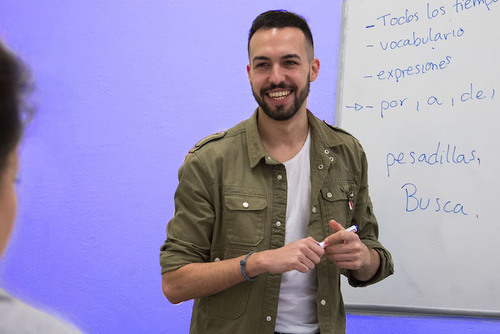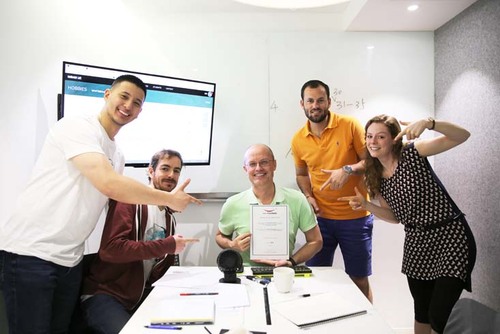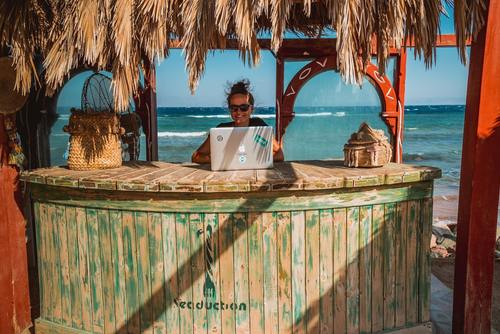Both online and classroom TEFL courses cost money, finding reputable certifications for cheap is difficult, so if you are investing, it is important you pass.
Whether you are a complete beginner, or already have experience in education, TEFL courses aren't really easy but taking a course is a great idea because you can achieve two life goals at once, improving your knowledge and getting to see amazing places in your spare time.
Studying and travelling can be fun, but it can also be a challenging experience especially compared to staying in a university campus or at home where you can set up a comfortable study area. But it is possible.
With these simple tips you can turn a dream of studying and travelling the world and make a success of both.
1. Choose the Right Course
If you are keen to experience living abroad, then studying abroad is a great way to live in a different location and travel.
There are so many different universities, colleges and institutions that offer programs like language courses, online courses, year long or semester study abroad opportunities.
The best thing is you will make new friends and get to go sightseeing in your spare time. If you are already in studyies or full time employment and are worried this experience isn't possible, there are also lots of short and long summer study options available perfect for all schedules.
2. Plan Your Schedule
Time is limited, and you definitely need to make the most of every day especially when you are not studying.
You should try to save as much time for sightseeing and other tourist activities as possible. This is the reason why you probably decided to embark on this adventure in the first place.
Set your priorities, check class schedules and do your assignments on time and keep track of your activities. If you feel like you won’t be able to fit writing essays into your timetable, try looking for websites which can help.
It will help you meet the deadlines and actually dedicate more time to mastering the skills you need for your future job.
3. Get the Right Equipment
Your hardware will be essential for your success, and buying a good laptop is essential.
You want something which is fast, portable, has enough space and is comfortable to use. Try to work out where you will be going and how much budget you have available.
Sometimes it is worth investing in a more expensive higher end laptop rather than a cheap one as it will be better and more reliable. You should also check for online apps which might enhance your learning and make the whole experience easier.
4. Make Backups
Make sure you have a backup of all important documents, passwords and websites. Before departing also make your life easier when abroad, for example, have you got all the necessary payments and subscriptions renewed? Is everything readily available when you need it?
Make sure you store documents, important details and programs you use on an online cloud service. It’s always a good idea to check twice before departing. You don't want to be overseas and lose your laptop or have any issues with the hardware and then be totally stuck without any backups.
5. Pack the Essentials
Make sure you pack sensibly for where you will be going. Even though most things nowadays are online, you should still take a pen and paper to make notes.
You should also research important books you might need before daprting. Maybe you need a very specific book that you won’t be able to easily find online so you will need to think about this well in advance.
Also don’t forget your laptop charger - many students somehow forget about it.
6. Find Comfortable Places to Study
Distractions can be an issue when studying in a different location you are used to. Be sure to seek out good places to study and work on arrival in your destination e.g. a library, cafe or quiet space.
It is important you can study in a relaxing environment where nothing will distract you. Also choose accommodation wisely, a hostel for example might be cheap, but an appartment might be a better place to live and study.
This way you will also be able to focus and stay motivated to achieve your goals and finish work.
7. Check Internet Access
You will need access to the world wide web no matter what or where you are studying.
Do your research - most local cafes should have WiFi as well as hotels and hostels, but certain places may lack these essentials.
If you happen to be in an area with bad internet coverage, you will plan your accordingly or get some sort of mobile or satellite internet access.
If you need to work with multimedia your needs for a high speed consistent connection are much higher and you also need to take this into consideration.
8. Make Friends
It’s always a good idea to talk to other people on your course, or who have done something similar. They might be able to help you with the workload and offer advice if they have had similar experiences.
Then if you encounter difficulties along the way, you will be able to ask for help from people who know a lot about the same lifestyle. Be sure to always request help from online tutors and staff too.
9. Set Your Goals
This journey of travelling and studying at the same time can be challenging and there are lots of students who do this every year and it can turn out to be an amazing experience.
Whether you choose a fixed location study abroad program, or are keen to learn on the go, set specific weekly, monthly or end game goals. This will help you to learn, improve and sucessfull complete a study program abroad.
10. Have Lots of Breaks
Plan lots of trips and adventures - this is one of the main benefits of studying in a different location. Breaks also help you to be refreshed and keep focused on studying.
If you are considering to study and travel you won’t regret this once in a lifetime experience! We hope these tips helped you make an important decision in your life or find a solution to a problem at hand and land you an amazing teaching job.
























